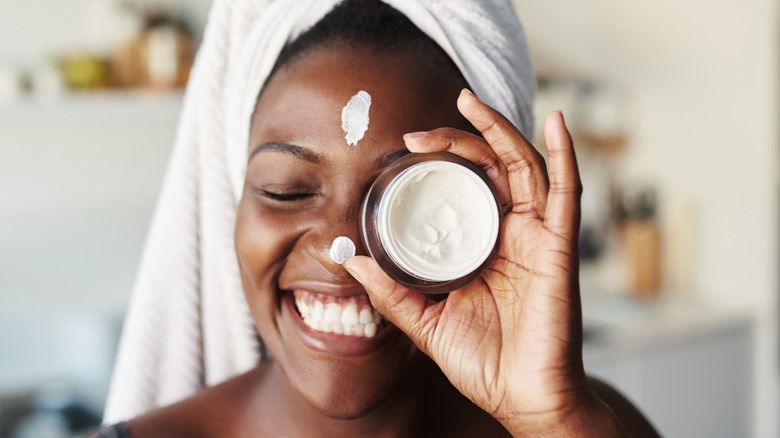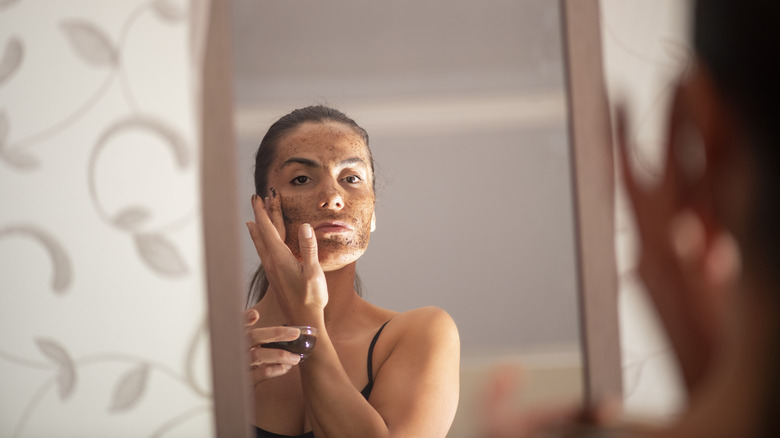Wait, What Does It Mean If A Skincare Product Causes Photosensitivity?
Ask a dermatologist or aesthetician about the most obvious signs of aging; dark spots will undoubtedly be near the top of their list. As we age, discoloration in our skin pigment becomes more prominent and ultimately affects the look of our skin's texture, making us appear older. How do we get discoloration? From being in the sun, of course. Some sun damage can be caused by products that make our skin more photosensitive or reactive to UV rays.
Women spend hundreds, if not thousands, of dollars annually on products that fight the signs of aging. Unfortunately, some of those products might be doing more harm than good. If you're using products containing photosynthesizing ingredients, you're throwing your money down the drain.
While cosmetic and skincare ingredient lists can be intimidating to suss through, it's well worth it to ensure you're getting your money's worth. Learning to tell the difference between photosynthesizing ingredients and those that protect your skin will keep your wallet — and skin — full and happy for years.
Not all anti-aging products are created the same
It sounds counterintuitive that any anti-aging company would promote products that speed up the development of dark spots, but many do. Chief among the culprits is retinol, a go-to for anyone trying to hold on to their youthful complexion. Retinol promotes cell turnover and growth to improve elasticity and decrease the appearance of fine lines. However, the fresh layer of skin that the retinol brings to the surface is susceptible to the sun. Too much sun can cause dark spots or, worse, skin cancer.
The good news is you can work retinol into your routine to prevent further signs of aging and photosensitivity. First and foremost, always apply the product at night, never in the morning. "Retinol is actually rendered less effective by sunlight, so it's doubly important to keep UV rays from reaching your skin while you use it." Deborah S. Sarnoff, MD, president of The Skin Cancer Foundation, told SkinCancer.org. Additionally, when you integrate retinol into your routine, only apply it a few times a week to give your skin a chance to adjust. Most importantly, if you purchase a strong retinol, purchase a strong, high-quality sunscreen and be sure to reapply every few hours.
Be wary of vitamin C
This one might be a shock, but certain types of vitamin C can cause severe photosensitivity. Vitamin C is the go-to for reversing hyperpigmentation and dark spots, but the wrong variety will do more harm than good. When figuring out what type of vitamin C to invest in, you must understand the differences in certain common ingredients. Any product with citrus oils — orange, lemon, grapefruit etc. — will cause photosensitivity. High levels of these ingredients can also cause phototoxic, meaning they break down under UV rays and damage your skin, making it more sensitive. So, if you prefer natural additive-free skincare, be sure you're reading the labels extra carefully.
While not necessarily dangerous, even high-quality vitamin C changes under UV rays, which can cause it to break down and be rendered useless. To make sure you're getting the most out of your product, apply your vitamin C in the morning at least half an hour before leaving the house.
Go easy on the exfoliation
If you're a skincare junkie, you probably already know to avoid physical exfoliants in favor of chemical alternatives. Skincare wisdom holds that chemical exfoliants like BHA and AHA are the way to go if you want a clear, even complexion. However, if you overdo it, the chemicals can prime your skin for more sun damage rather than reverse any pre-existing signs.
Figuring out how to work these ingredients safely into your routine can be tricky, as when used correctly, they can drastically improve your skin's appearance. AHA's glycolic and lactic acids are a good choice for someone with sensitive skin. BHA's, on the other hand, include more intense acids like salicylic acid are best for someone with oily or very acne-prone skin. AHA's might be a better choice if you have very fair or sensitive skin or are especially worried about sun damage. Similarly, it's best not to use an intense acid while using a retinol product since it will make your skin extremely sensitive to the sun and possibly other products.
At the end of the day, almost any ingredient — even photosynthesizing ones — can be part of a healthy skincare routine as long as you take proper precautions. "Regardless of if or when you use skin care products that cause photosensitivity, sun protection is important every day," Dr. Deborah S. Sarnoff told SkinCancer.org.



